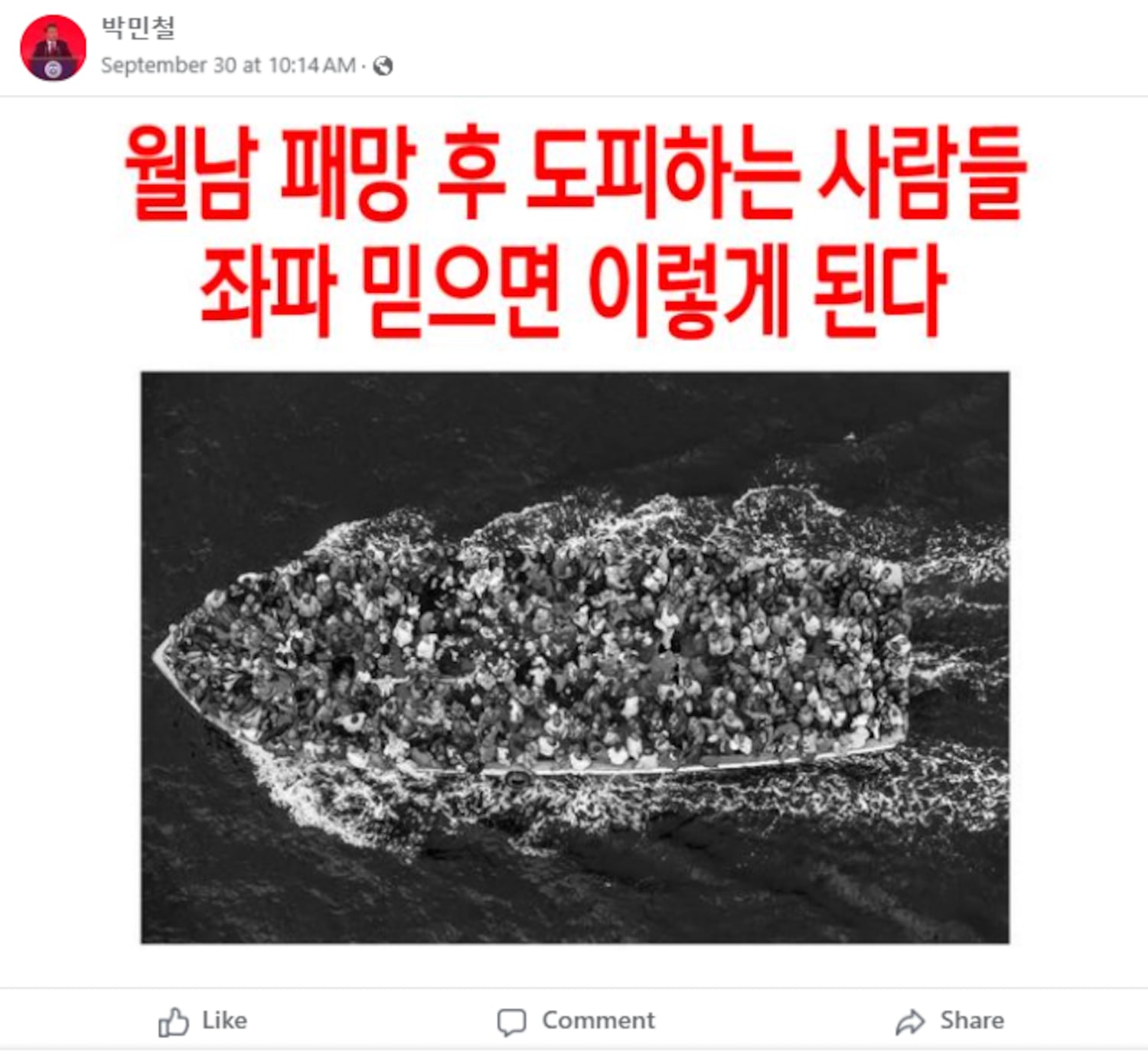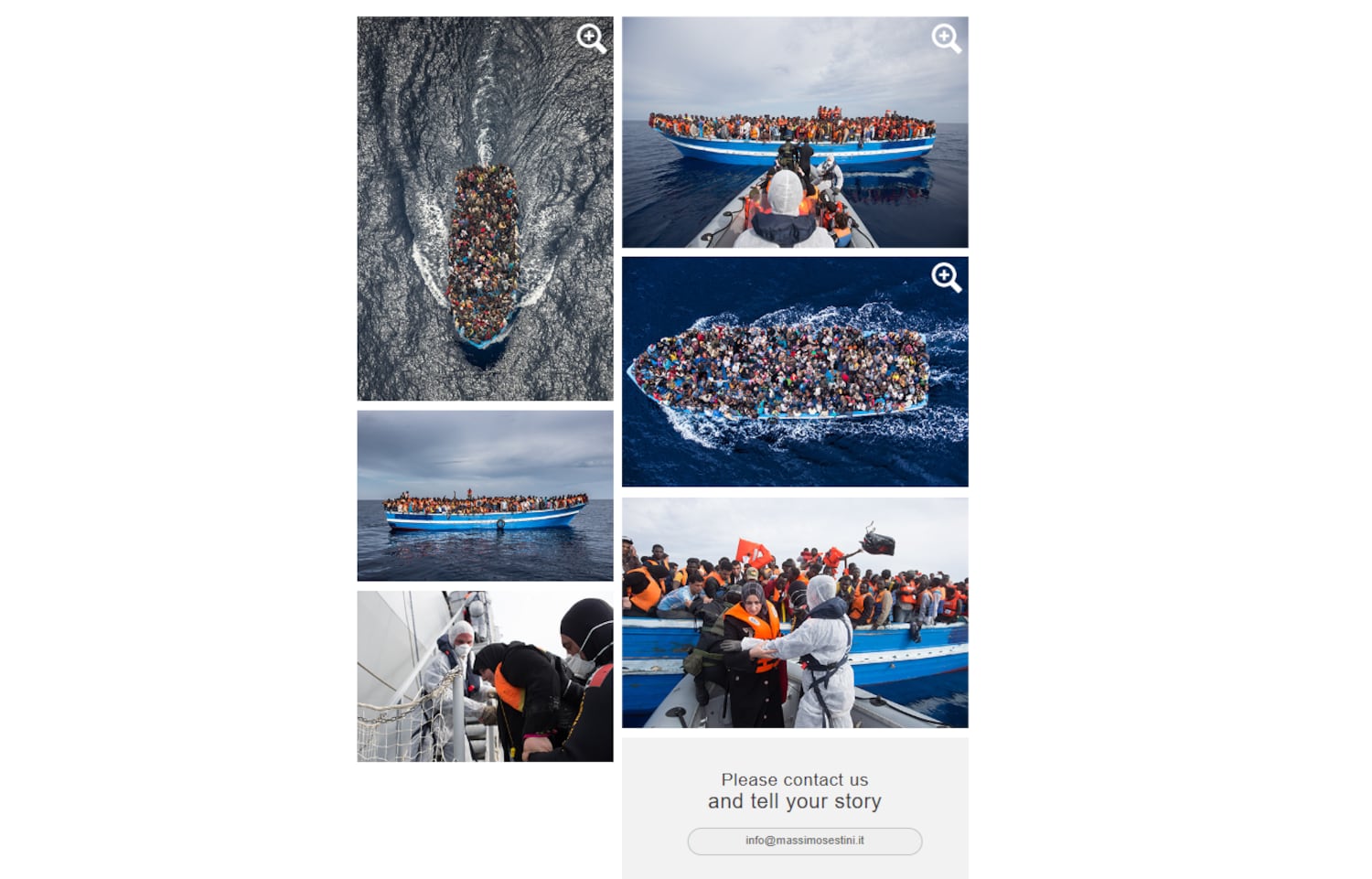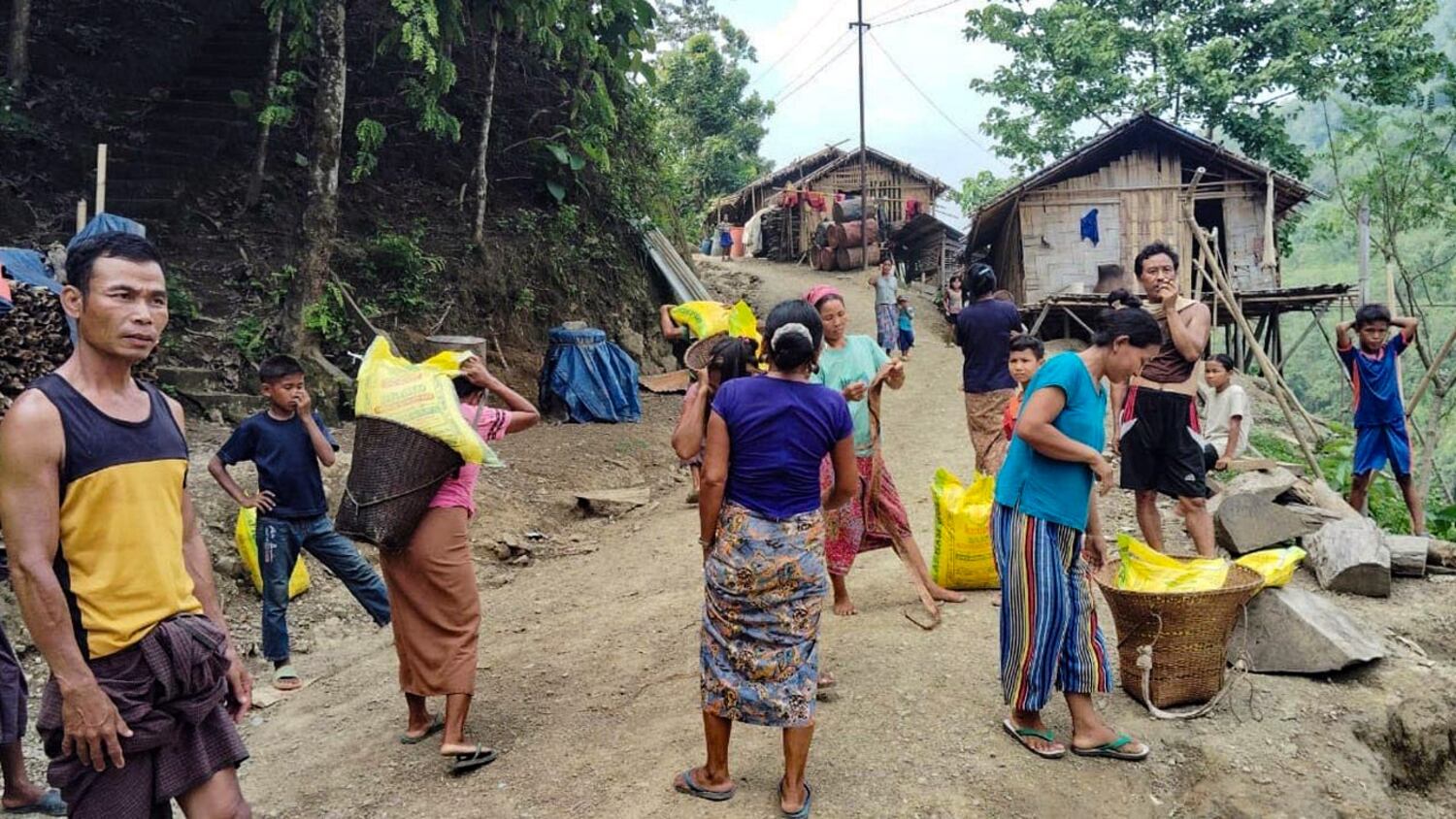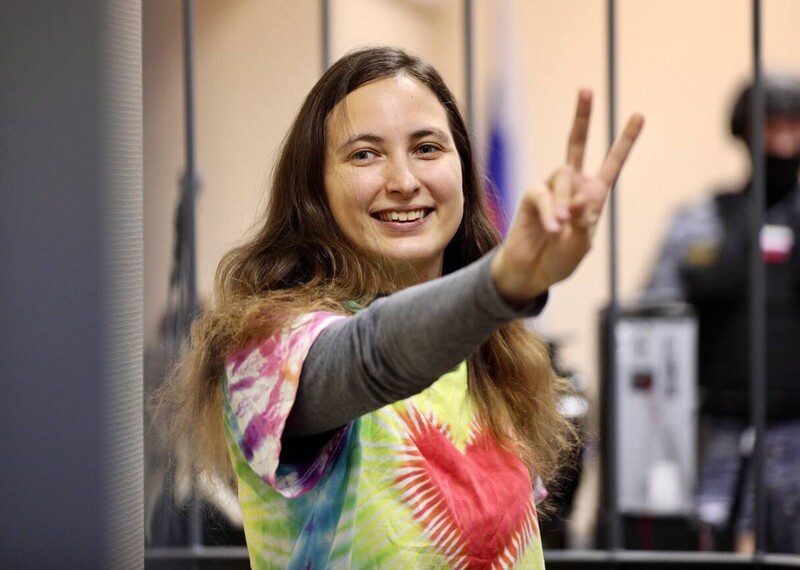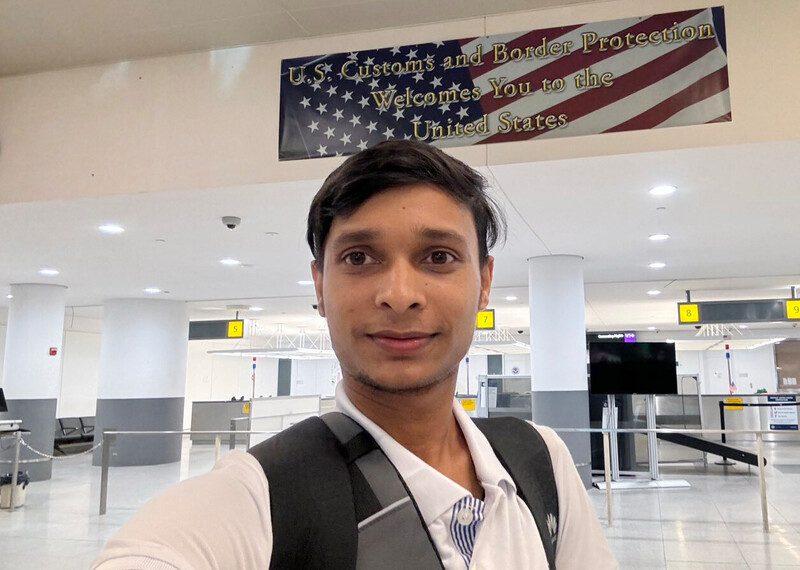When Koko (cuteness for Kareem) and Momo (cuteness for Mohammad) hear the bombs explode over eastern Rafah they are filled with joy. They don’t know any better, for they are not yet three years old and their father, Omar, tells them the bombs are fireworks.
“The people are celebrating,” he says. So now, when the explosions illuminate their bedroom at night like lanterns in the sky, his children get excited.
“It’s better than them being scared,” he tells me over video chat. “Besides, if the bombs fall on our house, we will all die instantly, so they’ll never know what hit them.” We both laugh. Omar can make a joke about anything.
He’s inspired by his children, especially the newest addition to the family, eighteen-month-old Mimi (cuteness for Maryam). Her joy is infectious, and the family is happy, or at least as happy as any family could be under the circumstances. And the circumstances are the complete eradication of life as they knew it before October 7, 2023.
“Here’s a video I took when our apartment building in Gaza City was bombed,” Omar says. “We barely escaped.”
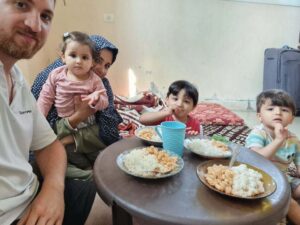
Omar Latifa and Children
Omar set the scene. “It was the beginning of November. My family including my brothers and parents lived in a ten-story apartment building. We had been watching the bombing of other neighborhoods, then the war came to us. The first rocket blew up the front of the building, knocking me unconscious. When I came to, my leg was injured and a neighbor dragged me back to my apartment. Then another rocket hit the place where I had just been, killing the family of one of my best friends. Bodies lay everywhere, but there was no time to grieve. I gathered up my family, and we had to walk down the stairs stepping over the dead.”
I watched in silence as first responders strapped a corpse to a stretcher on the ground floor and guided the wounded into the foyer. Those who can walk on their own decide to take their chances in the street. Omar begs them to stay inside, but they won’t listen.
“We have white shirts to wave,” they reassure him. “We’ll be okay.”
Halfway down the block a couple of Israeli tanks finish them off.
Omar waits for the tanks to leave the area, and then leads his extended family past his fallen neighbors to his uncle’s house. On the way, they cover themselves with wet sheets to protect against the white phosphorus dropped by the IDF (Israeli Defense Forces). Like a snowstorm of evil, white phosphorus fills the sky with trails of deadly pale smoke that, on contact, can burn human flesh down to the bone. Luckily, Israel denies they use white phosphorus on civilians, so any suffering must be imaginary.
Omar’s family makes its way to the new house without incident, but times are hard. The utilities fail. They have to walk several kilometers in one direction to get water. And several kilometers more in another to charge their smartphones—their lifeline for information about humanitarian aid and the fate of loved ones.
Then the IDF drops leaflets telling them they will be safe in Rafah. Omar and his family, though skeptical, decide to go and begin the long trek south to supposed safety. A third of the way into their trip by taxi, they encounter a roadblock and have to walk. Omar pushes his sick mother in a shopping cart along the street while his father follows behind, limping with a cane. Omar’s wife and two brothers each carry one of the children.
For agonizing hours they travel through a desolate land pockmarked by craters and unexploded ordnance. On occasion, they are force-marched between rows of Israeli soldiers, who make everyone hold a white shirt in one hand and their identification cards in the other. Those with backpacks keep their belongings. Those without, keep nothing. Dropped items are lost forever. Bend over to pick them up and get shot. For the lucky, to be called out of line is to be made to strip naked and stand for hours while looking down the barrel of a gun. The unlucky are never seen again.
In Rafah, the people are crammed together in endless rows of tents. A Palestinian ghetto is formed. Reminiscent of the Warsaw Ghetto in World War II, scabies, dysentery and lice multiple. Like its distant relative, the Rafah Ghetto will grow smaller and smaller with each new phase of occupation, until little remains to do for the refugees but be expelled to the next hopeless piece of land. If Gaza had been large enough, the Palestinians would have been put into cattle cars and herded to camps surrounded by barbed wire. But Gaza is small and already fenced in.
Without a tent, Omar’s family meanders from mosque to mosque. At least they have a roof over their head. Inside they are protected from wind and rain. But winter is coming, and during the night, without blankets, they shiver relentlessly. Then the IDF starts bombing the mosques, and Omar’s family grows increasingly desperate. Finally, in one of the few remaining houses of prayer, a good Samaritan notices Omar’s immobile parents and young children and offers them a room in his house. Relief.
In February I started to write about refugees and messaged an Indonesian photographer named Kawan. She curated photographs of the genocide in Gaza on social media. “How can you handle seeing all the death and destruction?” I asked.
She replied with a link to Omar’s Facebook profile and the words: “Omar has a story he wants to tell.”
So I contacted him. Gregarious, upbeat and confident, Omar is the most positive person I’ve ever met. He laughs when he recalls how he was paralyzed as a teenager.
“The doctors didn’t know what to do,” he says. “But I didn’t care what they knew. I just kept on living until I began to walk again.”

Koko and bandage
Shortly after our first talk, Omar spills boiling water on Koko while heating it on a jerry-rigged stove. Luckily, the nearest hospital was still open. Omar sends me a video of him bandaging the toddler at home. Burns: second-degree. Screams: heartbreaking.
The only way to deal with the pain is to welcome the suffering. Omar evaporates horror with a happy-go-lucky attitude. He also gets along with everyone, so it’s no surprise that his best friend is a Palestinian Christian named Fahmi. Christians have inhabited Gaza since the first century. The IDF shoots them. Hamas protects them. Strange bedfellows. Long ago the Israelis waged war on the various tribes of the land of Canaan, now they seek to destroy the Palestinians. History repeats itself. This land was always someone else’s. What would Jesus do?
It was Israeli threats that separated them. Fahmi sought refuge with his family in the Church of Saint Porphyrius—the third oldest Christian church in the world. The IDF instructed the Christians to seek safety in Rafah, but there was no church there. So they stayed where they were. If God decided it was their time to die, they would accept it. Fahmi would leave the Earth surrounded by those bonded by faith and blood. Besides, Israel would bomb them wherever they went. There has always been a deep Zionist hatred of Arabs, whether Muslim, Jewish or Christian. They had already eradicated the Arabic language and customs among Palestinian Jews. Now, all they had to do was annihilate the remaining Gentiles. ‘Innocent civilians be damned!’, ‘Let them starve, let them rot!’ were typical comments I saw on Israeli social media.
Omar and Fahmi lived in the old way. “Bonds of brotherhood, respect and love unite us. I was there when Fahmi wedded his wife Vivian, and he drove me to deliver the dowry for my then bride-to-be Alaa. Israel doesn’t like it when they see Palestinian Christians cooperate with Muslims. But we have so much in common, how could we not? Both of our wives are pharmacists, and our children are as adorable as ever. Fahmi was a project coordinator for the YMCA, and I was employed as the head of customer support for an Internet Service Provider. We owned our own homes and bought our cars. We served Gaza.”
It was the American Dream in Palestine. The difference? Our dreams are safe. Theirs had been exterminated. Now, they lived increasingly isolated from each other and the world, and with no Internet at the church, they lost contact. Omar’s messages and calls to Fahmi had gone unanswered. Then he heard the news that the IDF had bombed St. Porphyrius. Omar feared the worst.
I tried to contact the Christian community in Gaza and met Rami. He had done interviews with the international press, as well as written a story about the Gaza genocide for America Media, a Catholic magazine. He and his wife Maryan had an infant daughter named Kylie who was born just before the start of the war. She had spent her brief life getting acquainted with baptisms, killer drones and missiles. They were just like the first Christians who had been persecuted and crucified by the Romans two thousand years ago. I messaged Rami on social media and told him about Fahmi and Omar.
“What a coincidence,” Rami said. “I’m Fahmi’s brother-in-law and Omar’s friend.”
The Church’s Internet had just been restored, and soon they had a joyous online reunion. They reminisced about old times. Before Gaza was bombed to pieces, all three men would go to the beach to barbecue seafood and smoke shisha late into the night. Back then the world was a half-decent place for families with young children, and war was so far over the horizon that those young enough came to believe it had never existed. There had never been any suffering, and childhood memories of the intifada were just thoughts in storage, nightmares to be forgotten. Each man was pious, generous and loving. They were all People of the Book. They all worshiped the same God. Now, they were together again, if only online. Their friendship had survived.
Then came Ramadan. In years past Omar invited Fahmi over for Iftar, the evening Ramadan feast. This year they would be apart, but the holiday would still serve them. I met Hassan at a local Iftar feast and told him about my stories on refugees. I hadn’t seen him in years. Hassan was a reverted Jewish Muslim. As a young man, he had fully believed in Zionism. Then he ‘saw the light’, in his words. He and his wife Latifa, also a Muslim revert with a Jewish background, wanted to meet one of the refugees over Zoom. So I introduced them to Omar. He was his usual cheerful self and filled us in on the new developments in his life, his wife beside him, his children asleep.
“I have a new volunteer job,” he said. “A local charity has hired me to distribute money to the poor.”
Omar began navigating war-torn Gaza in a taxi while the IDF hunted humans from high above. The taxi could be blown up at any moment. Still, he was as enthusiastic as ever.
“There are those who love Allah and those who hide behind religion,” Hassan told me when the meeting was over. “I am humbled by Omar’s humility and his ability to endure the horrible tragedy we call war.”
Hassan and Latifa wanted to chat with Omar again. “Is it okay if we invite friends and relatives?” they asked.
“Sure,” I replied. And just like that, we had weekly Sunday meetings attended by Muslims, Jews and Christians.
Omar was our Gaza host. He learned English through an eight-year friendship with Cassandra, an American woman he met in an online chat group. The world could not be a stranger place, with this woman from a one-light town in the land of freedom, and a devout Muslim from an urban war zone in the land of hospitality. Omar embodies Sumood—the Palestinian word for a man of great composure, determination and perseverance—mixed with the energetic joy of a child. And Cassandra is his first-world counterpart.
To help raise money for Omar’s family, Cassandra set up an Instagram account full of video clips of Omar and his family. Please Donate To Save Their Lives!!! echoes through my consciousness as I watch the daily uploads. The contrast between their life now and that of the past is palpable. They had a beloved Siamese cat who was martyred when their apartment building collapsed after they fled. Now, they have a mourning dove whose coos soften the harshness of war. Grandmother was a respected embroiderer in times past. Now, she mends what little clothing they have left. Sometimes Cassandra does TikTok live streams where rude people hurl insults at her as she gathers donations. In America, the war of words never ends.
One day, as I watch a video of Mimi taking her first steps, Omar sends me a photograph of a missile exploding nearby. The next day he sends me a video clip of all the dead and wounded from the building it demolished.

Rami, Omar, and Fahmi
As the weeks go by, the Zoom meetings grow to include other refugees, starting a cascade of donations to their GoFundMe campaigns. The world seems like a better place. Fahmi and Rami finish raising the money they need to evacuate from Gaza. They have to bribe Egyptian officials with five thousand US dollars, a rate set by the Egyptian government, for every family member who wants to cross the border. It’s state-sanctioned human trafficking. On May 5th, Omar meets Fahmi and Rami at the Rafah border crossing and sends me photographs. Smiles abound. Later that day Omar gets more good news: Mark Hoffman, an American who I had recruited to help with refugee fundraisers, donates the rest of the money Omar’s family needs to leave Gaza.
That night I watched a video of Fahmi decorating a Christmas tree before the war. All is calm, all is bright. Then comes the war machine. Hamas has accepted a cease-fire deal, but despite Palestinian celebrations, it turns out not to be. In the early morning hours of May 6th, the IDF bombs a house a block away from Omar’s home. Then another. The charade is over. Kareem and Mohammad are crying. There are no fireworks, just enemies. There is no safe place; it was all an illusion Israel conjured up to appease its international partners and UN charities.
In the morning the IDF drops leaflets again, this time with evacuation orders for eastern Rafah: We are here to save you from the terrorists. You must leave this zone immediately and migrate to the safe havens that are being prepared for you. Do not listen to the humanitarian aid agencies. Rebel against Hamas. If you die, you can file a complaint. Maryam has taken a bite out of the leaflet. Even small children can see the lies. Omar and his family make preparations to flee. By the end of the day, Alaa and the children have migrated to her parent’s house. Omar’s parents had already left the previous week. His brothers follow.
I watch more Instagram videos to pass the time. Koko plays with the family cat. Momo bangs on a keyboard. Mimi giggles as she somersaults off a bed. Omar poses in front of a demolished building with a smile like he is having fun at the beach. Alaa cooks flatbread atop meager sticks of firewood. I cry as clips of the entire family move across the screen and You Are My Sunshine plays in the background. Momo and Koko roam a tiny olive orchard behind their house in Rafah, as quaint Lavender drones hover above them, rifles locked and loaded. It’s rumored they’re controlled by AI. A premonition of things to come? At any moment, these memories may become all that remains of Omar and his family.
In a panic, I call Omar. His family is safe, but he doesn’t want to leave Rafah. Now, it’s too late. The bombs are falling too fast for the taxi drivers to risk going to pick him up. He’s stuck at the house with his cousin. He wants to run, but during the night they’re trapped by drones that shoot anything that moves. I hear rockets exploding in the background, but Omar’s not afraid. He’s joking about how even the stray dogs knew the IDF was coming, for they left eastern Rafah with the refugees. We laugh as the explosions get closer. Eventually, he hangs up to make a run for it as the sun rises. He wants to take a solar panel someone had donated, but the owner of the house said no, and it’s too heavy to run with anyway.
Omar runs past burning homes and empty streets. People’s lives, whole family’s lives, lie in smoldering ruins with nothing but twisted metal and charred remains to mark the occasion. He stumbles over motionless bodies and prays that the dead have found peace. Then, as the explosions fade in the distance, the smoke dissipates and the air becomes cool and clean. Everything is silent. The drones are long gone. A Palestinian Sunbird with glossy blue-green feathers whistles in the stillness, looking for a mate. Later that day, I found out that Omar was safe.
Days after the IDF had come and gone, Omar ventured back to see what was left of the house. To no surprise, it had been flattened by a bomb, and the solar panels were crushed to pieces.
Omar relocates to Al Mawasi, a beach town that overlooks the Mediterranean. As the invasion continues, the rest of Rafah empties of civilians. Soon over a million people crowd Omar’s space. His family is one of the lucky ones who have a tent, but he’s depressed nonetheless. The internet is not working. I can only reach him by phone, a sketchy proposition since Israel only allows 2G in Gaza. 2G!!! That means practically no cellular data. The IDF has to stop the truth from getting out.
Omar continues working for the charity. It’s not registered, so I can’t name them. They’re trying to avoid the authorities. Which ones? I never ask. All governments are the same: they have a mountain of red tape that costs money and a lawyer just to navigate. The Jordanians register NGOs in conjunction with the Palestinian Authority in the West Bank, but they don’t have any power in Gaza. Of course, Gaza has no working government, so there’s no way anyone can register there. The charity is run by local people and funded by donors outside of Gaza. The workers are like Omar—everyday people who have stepped up to help when conditions call for action. The donors include Palestinian emigres from the left and the right, religious or not, who can’t stand to watch their country be destroyed.
Omar gets promoted. Now, he’s setting up a camp for pregnant women and widows with children. I send refugees his way. Omar gives food to a family eating animal feed. He gets medication for a one-year-old whose face is rotting off as recorded in my story Gaza’s Last Fairytale. But not everything is easy. They give away tents to the needy, but some of the recipients try to sell them. They rent an apartment for Omar in Deir al-Balah, but the families on either side of him have a shootout. Corruption and lawlessness grow as Israel kills more and more police and aid workers, part of their plan to cause chaos and strife. Eventually, the pressure will be too much and Omar will take a break from volunteering, but for now, he’s doing the best he can.
One day I told Omar about a refugee who sent me a video of someone collecting human body parts for burial. I told her never to send a video like that to any of the donors I work with. I’m afraid she’ll scare them away.
“That’s quite funny,” Omar tells me with a smile. “I can imagine the look on your face when you opened up the video thinking it was some nice plea for donations by an innocent young woman in a hijab, only to see human flesh and bones.”
“Omar, you’re crazy,” I say, shaking my head in disbelief.
“I’m crazy?” he replies. “Think about the people who are bombing us!” And the greatest man in Gaza bursts out laughing.
You can find out more about Omar here
If you want to attend Omar’s Zoom meetings, please email the author at moc.liamgnull@erotavlassore.
The post
The Greatest Man in Gaza first appeared on
Dissident Voice.
This post was originally published on Dissident Voice.



